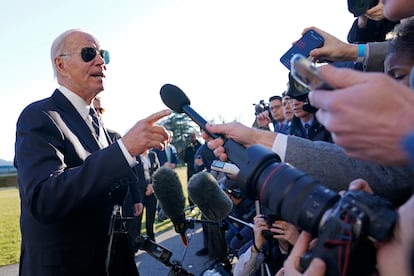President Biden to end Covid-19 emergencies on May 11
The move would formally restructure the federal coronavirus response to treat the virus as an endemic threat to public health

President Joe Biden informed Congress on Monday that he will end the twin national emergencies for addressing Covid-19 on May 11, as most of the world has returned closer to normalcy nearly three years after they were first declared.
The move to end the national emergency and public health emergency declarations would formally restructure the federal coronavirus response to treat the virus as an endemic threat to public health that can be managed through agencies’ normal authorities.
It comes as lawmakers have already ended elements of the emergencies that kept millions of Americans insured during the pandemic. Combined with the drawdown of most federal Covid-19 relief money, it would also shift the development of vaccines and treatments away from the direct management of the federal government.
Biden’s announcement comes in a statement opposing resolutions being brought to the floor this week by House Republicans to bring the emergency to an immediate end. House Republicans are also gearing up to launch investigations on the federal government’s response to Covid-19.
Then-President Donald Trump first declared the Covid-19 pandemic a national emergency on March 13, 2020. The emergencies have been repeatedly extended by Biden since he took office in January 2021, and are set to expire in the coming months. The White House said Biden plans to extend them both briefly to end on May 11.
“An abrupt end to the emergency declarations would create wide-ranging chaos and uncertainty throughout the health care system – for states, for hospitals and doctors’ offices, and, most importantly, for tens of millions of Americans,” the Office of Management and Budget wrote in a Statement of Administration Policy.
Congress has already blunted the reach of the public health emergency that had the most direct impact on Americans, as political calls to end the declaration intensified. Lawmakers have refused for months to fulfill the Biden administration’s request for billions more dollars to extend free Covid vaccines and testing. And the $1.7 trillion spending package passed last year and signed into law by Biden put an end to a rule that barred states from kicking people off Medicaid, a move that is expected to see millions of people lose their coverage after April 1.
The costs of Covid-19 vaccines are also expected to skyrocket once the government stops buying them, with Pfizer saying it will charge as much as $130 per dose. Only 15% of Americans have received the recommended, updated booster that has been offered since last fall.
Once the emergency expires, people with private insurance will have some out-of-pocket costs for vaccines, tests and treatment, while the uninsured will have to pay for those expenses in their entirety.
Legislators did extend telehealth flexibilities that were introduced as Covid-19 hit, leading health care systems around the country to regularly deliver care by smartphone or computer.
The Biden administration had previously considered ending the emergency last year, but held off amid concerns about a potential “winter surge” in cases and to provide adequate time for providers, insurers and patients to prepare for its end.
A senior administration official said the three months until the expiration would mark a transition period where the administration will “begin the process of a smooth operational wind-down of the flexibilities enabled by the Covid-19 emergency declarations.” The official spoke on the condition of anonymity to discuss the announcement before it had been released.
More than 1.1 million people in the US have died from Covid-19 since 2020, according to the Centers for Disease Control and Prevention, including about 3,700 last week.
Case counts have trended downward after a slight bump over the winter holidays, and are significantly below levels seen over the last two winters – though the number of tests performed for the virus and reported to public health officials has sharply decreased.
Moments before the White House’s announcement, Rep. Tom Cole, R-Okla., accused the president of unnecessarily extending the public health emergency to take action on issues like forgiving some federal student loan debts.
“The country has largely returned to normal,” Cole said Monday, introducing a Republican-backed bill calling for an end to the health emergency. “Everyday Americans have returned to work and to school with no restrictions on their activities. It is time that the government acknowledges this reality: the pandemic is over.”
Sign up for our weekly newsletter to get more English-language news coverage from EL PAÍS USA Edition
Tu suscripción se está usando en otro dispositivo
¿Quieres añadir otro usuario a tu suscripción?
Si continúas leyendo en este dispositivo, no se podrá leer en el otro.
FlechaTu suscripción se está usando en otro dispositivo y solo puedes acceder a EL PAÍS desde un dispositivo a la vez.
Si quieres compartir tu cuenta, cambia tu suscripción a la modalidad Premium, así podrás añadir otro usuario. Cada uno accederá con su propia cuenta de email, lo que os permitirá personalizar vuestra experiencia en EL PAÍS.
¿Tienes una suscripción de empresa? Accede aquí para contratar más cuentas.
En el caso de no saber quién está usando tu cuenta, te recomendamos cambiar tu contraseña aquí.
Si decides continuar compartiendo tu cuenta, este mensaje se mostrará en tu dispositivo y en el de la otra persona que está usando tu cuenta de forma indefinida, afectando a tu experiencia de lectura. Puedes consultar aquí los términos y condiciones de la suscripción digital.








































